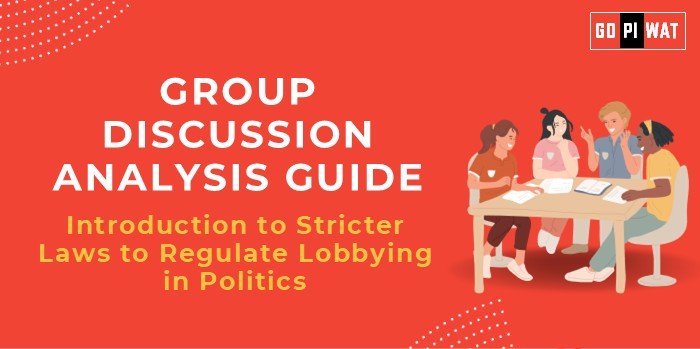📋 Group Discussion (GD) Analysis Guide
🌐 Introduction to Stricter Laws to Regulate Lobbying in Politics
🌟 Opening Context
Lobbying, the practice of influencing political decision-making, is often viewed as a double-edged sword in democracies. While it provides a channel for interest groups to represent their causes, unregulated lobbying can lead to corruption and undue influence, undermining public trust.
📜 Topic Background
Lobbying, prevalent in countries like the United States, has fueled debates about its ethical boundaries and its regulation. India currently lacks a formal framework for lobbying, leading to concerns over opacity and conflicts of interest. Recent scandals have reignited discussions on the need for stricter lobbying laws.
📊 Quick Facts and Key Statistics
- 💰 US Lobbying Expenditure (2022): $3.7 billion – Highlights the scale of the lobbying industry globally.
- 📉 India’s Corruption Perception Index (CPI, 2023): Rank 85/180 – Indicates concerns about governance and influence transparency.
- 📊 Public Trust in Government (Edelman Trust Barometer 2024): 56% – Reflects the impact of perceived corruption on trust.
- ⚠️ Scandals: Instances like the coal and telecom allocation scams have spotlighted the risks of unregulated lobbying.
🤝 Stakeholders and Their Roles
- 🏛️ Government: Enacts regulations and ensures transparency.
- 🏢 Corporates: Often engage in lobbying for favorable policies and incentives.
- 🌍 NGOs/Civil Society: Advocate for ethical practices and transparency in governance.
- 📰 Media: Exposes unethical lobbying practices and fosters accountability.
🏆 Achievements and Challenges
✨ Achievements:
- 📈 Economic Growth Facilitation: Lobbying has helped industries like IT and telecom secure favorable policies, boosting economic growth.
- 💡 Policy Input: Facilitates dialogue between policymakers and stakeholders.
- 🌎 Global Benchmarks: Countries like the US and Canada have frameworks to regulate lobbying, enhancing transparency.
⚠️ Challenges:
- ⚖️ Lack of Legal Framework in India: Creates ambiguity around ethical lobbying practices.
- ❌ Opaque Systems: Absence of mandatory disclosures enables conflicts of interest.
- 📉 Global Comparisons: While countries like Canada ensure strict compliance, India lags in transparency.
💡 Structured Arguments for Discussion
- ✔️ Supporting Stance: “Stricter lobbying laws can curb corruption and build public trust in governance.”
- ✖️ Opposing Stance: “Overregulation of lobbying could hinder dialogue between industries and policymakers.”
- ⚖️ Balanced Perspective: “While stricter laws are essential, they must balance transparency with the need for stakeholder input.”
🗣️ Effective Discussion Approaches
- 🎯 Opening Approaches:
- 📊 Start with a statistic: “India ranks 85 on the CPI, highlighting a critical need for governance reform.”
- ❓ Pose a question: “Can lobbying ever be ethical without strict regulation?”
- 💬 Counter-Argument Handling: If overregulation is cited as a challenge, argue for phased implementation or global benchmarks like Canada’s Lobbying Act.
🔍 Strategic Analysis of Strengths and Weaknesses
- 💪 Strengths: Encourages stakeholder engagement, economic benefits from favorable policies.
- ⚡ Weaknesses: Ethical ambiguity, risk of corruption.
- 🌟 Opportunities: Create a transparent framework, align with global best practices.
- ⚠️ Threats: Resistance from powerful lobbies, enforcement challenges.
📚 Connecting with B-School Applications
- 📖 Real-World Applications: Exploring lobbying’s role in industries like finance, healthcare, or technology policy development.
- 🎓 Sample Interview Questions:
- ❓ “What lessons can India learn from the US lobbying framework?”
- ❓ “How does unregulated lobbying impact India’s global image?”
- 💡 Insights for B-School Students:
- Relevance in governance and CSR.
- Use as a case study in ethics and public policy.


